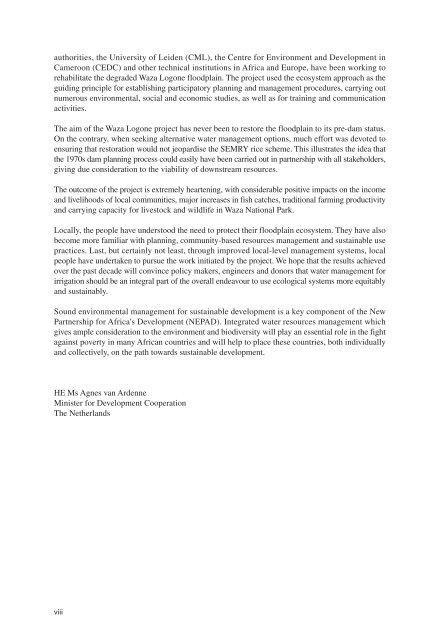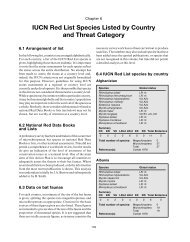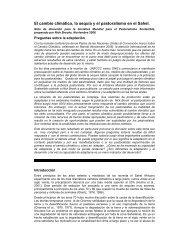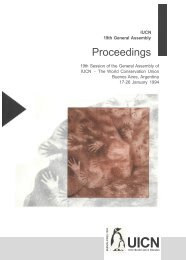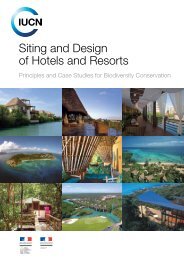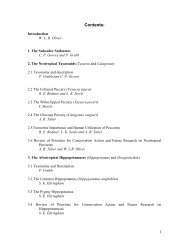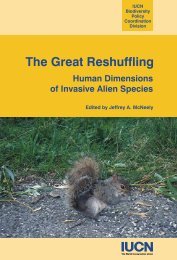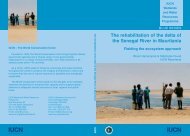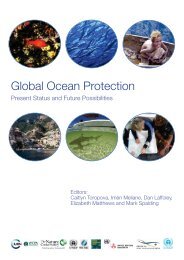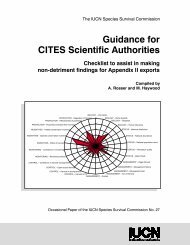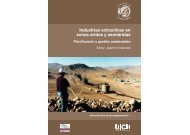The return of the water - IUCN
The return of the water - IUCN
The return of the water - IUCN
You also want an ePaper? Increase the reach of your titles
YUMPU automatically turns print PDFs into web optimized ePapers that Google loves.
authorities, <strong>the</strong> University <strong>of</strong> Leiden (CML), <strong>the</strong> Centre for Environment and Development in<br />
Cameroon (CEDC) and o<strong>the</strong>r technical institutions in Africa and Europe, have been working to<br />
rehabilitate <strong>the</strong> degraded Waza Logone floodplain. <strong>The</strong> project used <strong>the</strong> ecosystem approach as <strong>the</strong><br />
guiding principle for establishing participatory planning and management procedures, carrying out<br />
numerous environmental, social and economic studies, as well as for training and communication<br />
activities.<br />
<strong>The</strong> aim <strong>of</strong> <strong>the</strong> Waza Logone project has never been to restore <strong>the</strong> floodplain to its pre-dam status.<br />
On <strong>the</strong> contrary, when seeking alternative <strong>water</strong> management options, much effort was devoted to<br />
ensuring that restoration would not jeopardise <strong>the</strong> SEMRY rice scheme. This illustrates <strong>the</strong> idea that<br />
<strong>the</strong> 1970s dam planning process could easily have been carried out in partnership with all stakeholders,<br />
giving due consideration to <strong>the</strong> viability <strong>of</strong> downstream resources.<br />
<strong>The</strong> outcome <strong>of</strong> <strong>the</strong> project is extremely heartening, with considerable positive impacts on <strong>the</strong> income<br />
and livelihoods <strong>of</strong> local communities, major increases in fish catches, traditional farming productivity<br />
and carrying capacity for livestock and wildlife in Waza National Park.<br />
Locally, <strong>the</strong> people have understood <strong>the</strong> need to protect <strong>the</strong>ir floodplain ecosystem. <strong>The</strong>y have also<br />
become more familiar with planning, community-based resources management and sustainable use<br />
practices. Last, but certainly not least, through improved local-level management systems, local<br />
people have undertaken to pursue <strong>the</strong> work initiated by <strong>the</strong> project. We hope that <strong>the</strong> results achieved<br />
over <strong>the</strong> past decade will convince policy makers, engineers and donors that <strong>water</strong> management for<br />
irrigation should be an integral part <strong>of</strong> <strong>the</strong> overall endeavour to use ecological systems more equitably<br />
and sustainably.<br />
Sound environmental management for sustainable development is a key component <strong>of</strong> <strong>the</strong> New<br />
Partnership for Africa's Development (NEPAD). Integrated <strong>water</strong> resources management which<br />
gives ample consideration to <strong>the</strong> environment and biodiversity will play an essential role in <strong>the</strong> fight<br />
against poverty in many African countries and will help to place <strong>the</strong>se countries, both individually<br />
and collectively, on <strong>the</strong> path towards sustainable development.<br />
HE Ms Agnes van Ardenne<br />
Minister for Development Cooperation<br />
<strong>The</strong> Ne<strong>the</strong>rlands<br />
viii


